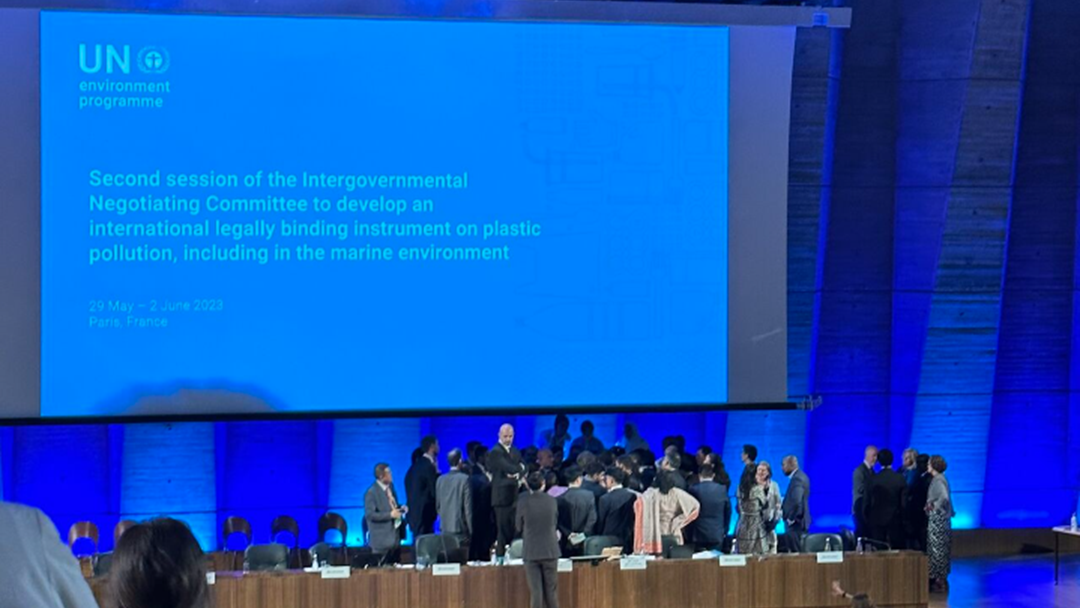“Excellencies, distinguished delegates, ladies and gentlemen”
Polite but tense (and politicized) discussions during the first day of the Second Session of the Intergovernmental Negotiating Committee on Plastic Pollution (INC-2).

On May 29th 2023, in the heart of Paris, at the premises of the United Nations Educational, Scientific and Cultural Organization (UNESCO), multilateral negotiations towards a new global treaty to end plastic pollution resumed after its first session in Uruguay in November 2022. The treaty negotiations are expected to conclude by December 2024 after 3 subsequent sessions with a legally binding treaty. During this INC-2 one-week meeting, the intention was to move forward with laying the groundwork for a zero draft text to be made – this was made crystal clear by French President Emmanuel Macron, who gave a pre-recorded talk as the plenary session started.
As is usual during these negotiations, the first hours focus primarily on organizational matters. The first agenda item was aptly named “Opening of the session” – and this agenda item went by smoothly, with inspirational talks from among others the Chair of the INC Mr. Gustavo Meza-Cuadra Velasquez of Peru, French President Emmanuel Macron and UNEP Secretary General Inger Anderson. The latter received enthusiastic applause during her talk, for example when stating loud and clear that “…we cannot recycle ourselves out of this mess…” and that we should never forget the marginalized and indigenous communities when drafting the treaty text.
The Chair then eager attempted to get through the second item on the agenda– election of officers of the Bureau. The Bureau is a group that provides guidance to the secretariat of the INC in organizing the meetings and is chaired by Gustavo Meza-Cuadra Velázquez from Peru, who was elected during INC-1 in Uruguay.
During INC-1 it was agreed, however, to defer the election of the vice-chairs and the designation of a rapporteur until this second session in Paris to allow for further consultations on the matter. The INC consists of six regional groups of member states that each have two vice-chairs in the bureau except Small Island Developing States who have 1 vice-chairs while the others - African; Asia-Pacific; Latin American and Caribbean; Western European and other; and Eastern European, each have two vice-chairs. Though most had the same number of nominations as there were seats available, this was not the case with Eastern European states, who had three nominations and two seats (Georgia, Estonia, and the Russian Federation). In addition, there was an objection to one of the nominees of the Western European and other states.
When the Romanian delegate took the floor and provided the background for the reason for three nominees for Eastern European states, however, there was a lot of disruption in the room and the Russian delegate was standing and waving to the Chair, raising a “Point of order”, indicating that he believed that the Chair was not following the Rules of Procedure or being sufficiently active in ensuring that the Romanian delegate did so. Long story short – because of the different number of nominations, the Chair stated that there would be a secret ballot where the member states would vote on who would be the Vice-Chairs from these two regional groups. This resulted in another avalanche of procedural questions and points of orders from delegates such as Saudi Arabia, Brazil, Iran and others – including Ukraine – which again resulted in Russia taking the floor again.
In the end we were presented with 'The Box' and unlike David Fincher's 1995 film 'Se7en', we knew what was in this box – votes from all UN member states to come to a majority vote for the Eastern European and Western European and other states vice-chairs.
Disagreement around procedural matters is delaying what the real point of being in Paris is – coming to an agreement on language in a legally binding agreement on plastic pollution, including in the marine environment. Bringing everyone closer to one another and achieving the global goal of consensus (when 100% agree on a topic) is viewed by some member states as a 'necessity' to what will make the treaty effective in the end. The other views came from the Delegate from Senegal who stated and had the plenary room cheer to 'Concensus kills demoncracy'. Meaning it is unrealistic to have all member states agree on everything. Regardless, all must be on board for us to be able to discuss an instrument to end plastic pollution. If it is going to be successful, we will need text that can be implemented in the majority of countries where the majority of people live in the world – because these countries’ ability to adopt, ratify and enter the agreement into force is important at a global level.
"When you want to protect the environment you often have to set aside national interest and preserve the planet for the good will of everyone." – Delegate from Senegal
